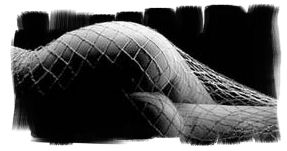The Slaves
Beasts to be Owned
He is Master, and I am Slave.
He is owner, and I am owned.
He commands, and I obey.
He is to be pleased, and I am to please,
Why is this?
Because he is Master and I am Slave.
— Explorers of Gor, pages 178-179
Philosophy of Slavery
Goreans hold a firm belief that men were born free and women were born to be their slaves.  This belief is in no way an indication that the Gorean man does not like women. On the contrary, to him it is merely a fact of nature that man is the dominant species and that woman are not. A simply philosophy, it implies no malice. The enslavement of women is an everyday fact and randomly accepted by those native to Gor.
This belief is in no way an indication that the Gorean man does not like women. On the contrary, to him it is merely a fact of nature that man is the dominant species and that woman are not. A simply philosophy, it implies no malice. The enslavement of women is an everyday fact and randomly accepted by those native to Gor.
It's rather interesting to note the duality in which Gorean men place the woman's status and the ease with which they seem to balance this duality. On one hand, it is universally understood that slavery makes the woman's worth no more than that of an animal, and by Gorean law she is neither citizen nor even a person. Then there are the tales of love between masters and slaves; a love denied as no Gorean would ever admit to caring for a slave. Nonetheless the actions and words speak volumes of what certain slaves represent to those who own them, despite much reluctance to admit it.
Swords are often drawn on Gor over women, and particularly over lovely slaves. Women are prizes, perfections and treasures. It is no wonder that men fight over them with ferocity. Wars have been fought to recover a stolen slave. — Renegades of Gor, page 397.
On the pages provided, exploration is made into the Gorean slave, male and female, the kajirus and the kajira, and what differences between them other than gender-related.
![]()
Special Note
Because of the differences in publishing the books, depending upon whether published in the U.S. or Europe, depending upon whether a first publishing or a Masquerade Books release, page numbers will often vary. All of my quotes are from original, first-printing U.S. publications (see The Books page for a listing of publishers and dates) with the exception of the following books:
- Tarnsman of Gor (2nd Printing, Balantine)
- Outlaw of Gor (11th Printing, Balantine)
- Priest-Kings of Gor (2nd Printing, Balantine)
- Assassin of Gor (10th Printing, Balantine)
- Raiders of Gor (15th Printing, Balantine)
- Captive of Gor (3rd Printing, Balantine)
Disclaimer
These pages are not written for any specific home, but rather as informational pages for those not able to get ahold of the books and read them yourself. Opinions and commentaries are strictly my own personal views, therefore, if you don't like what you are reading — then don't. The information in these pages is realistic to what is found within the books. Many sites have added information, assuming the existences of certain products and practices, such as willowbark and agrimony for healing, and travel to earth and back for the collection of goods. I've explored the books, the flora, the fauna, and the beasts, and have compiled from those mentioned, the probabilities of certain practices, and what vegetation mentioned in the books is suitable for healing purposes, as well as given practicalities to other sorts of roleplaying assumptions.